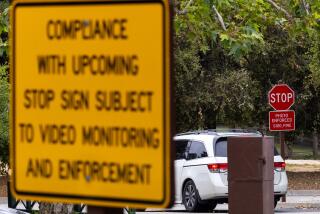Citations may be the ticket to safety
- Share via
Traffic tickets and routine traffic enforcement almost never figure prominently in any discussion about how the government or the auto industry can improve safety and reduce the extraordinary carnage on U.S. roads.
But compelling new evidence from a study by the University of Toronto and Stanford University has shown the importance of the ordinary traffic ticket, handed out by law enforcement by the tens of thousands every day.
A driver who receives a traffic ticket is 35% less likely to die in a car crash within the next four months, according to the study to be published in Lancet, a medical journal.
“We think the drop in fatality rates is directly due to the deterrent effect,” said Donald Redelmeier, a professor of medicine at the University of Toronto who was the lead author of the study and who has published earlier studies on auto safety.
It’s not too hard to figure out why. After getting a ticket, drivers are cautious and do not want to get caught again. A ticket carries a fine, and most insurers will increase premiums for a second ticket received within a year of the first. After too many tickets, a driver risks a license suspension because of points assigned by the Department of Motor Vehicles.
So the ticketed driver slows down, obeys traffic signals and generally plays it cool behind the wheel, all the while fuming about the inherent lack of fairness of getting a ticket.
The study reports a wide range of benefits from enforcement. One life is saved for every 80,000 tickets written. An emergency room injury is prevented for every 1,300 tickets written.
Redelmeier noted that 60% of the traffic convictions in his study involved speeding. Fatigue, distraction, aggression and speeding are believed to cause the majority of roadway fatalities, yet U.S. federal policy is focused on drunk driving. There’s nothing wrong with getting drunks off the road, but that’s not enough to guarantee safety, many experts say.
Although auto safety policy is often dictated from Washington by federal regulators, the level of traffic enforcement and the number of tickets police write are mostly determined locally.
Unfortunately, many cities regard traffic citations as a revenue source, rather than a key to safety, and that’s the way most motorists perceive how the system works, said Robert J. Tibshirani, a coauthor of the study who is a professor of health research and policy at Stanford.
With the focus on revenue, the volume of tickets written is not connected to any systematic effort to reduce fatalities.
“It is remarkably inconsistent from state to state, and that inconsistency can contribute to thousands of deaths every year,” Redelmeier said. “Police often view traffic patrol as a lesser duty.”
The study provides the tools for safety advocates to take a more scientific approach.
Redelmeier and colleagues examined driving records, citations and fatalities in Ontario, Canada, during the last 11 years. The benefits of strong traffic enforcement may be even more pronounced in this country, where traffic fatality rates are higher: The United States records 150 traffic deaths per 1 million people each year, compared with 120 deaths per million in Canada.
The drop in fatalities after the issuance of a ticket was consistent among all demographic groups in the study: young and old, men and women, low income and high income, Redelmeier said. That consistency is important because it shows that enforcement has as strong a deterrent effect on high-risk young male drivers as on other groups.
On average, drivers in Ontario get a ticket every five years. By increasing that rate, Redelmeier believes, government can drive down the fatality rates in a cost-effective way. Generally, traffic tickets are self-financing, so the misbehaving driver pays for the cost of the safety benefit.
Taken to the extreme, if drivers were to get a ticket every four months, about 15,000 lives would be saved in the United States. Of course, that would never happen. Millions would lose their licenses, and such heavy enforcement would require a virtual police state to achieve.
“The big drawback for enforcement is that it is not a big public relations winner,” Redelmeier said.
New technology, however, could allow for low-cost ticket writing campaigns.
In addition to red light cameras, engineers are perfecting automated radars that could nab speeders and take their pictures. The system could be tuned to reducing deaths, rather than raising money, Redelmeier believes.
So next time you get a ticket, maybe you should thank the police officer for improving by 35% the chance that you won’t be killed in the next 16 weeks.
*
Ralph Vartabedian responds in this column to automotive questions of general interest. Write to Your Wheels, Business Section, Los Angeles Times, 202 W. 1st St., Los Angeles, CA 90012; ralph.vartabedian@latimes.com.







